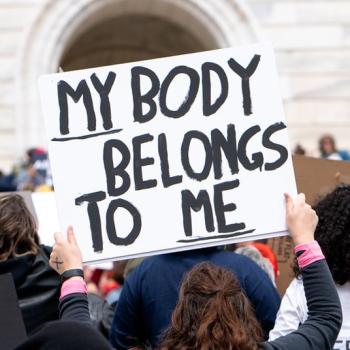A subset of American Christians believe the United States should be (or already is) a Christian nation, and in that vein want to see Christian symbols in public spaces. “It’s what our founders had in mind,” they insist.
While many Americans, both Christian and otherwise, believe the at least some of the founding fathers were devout Christ-followers, this is actually more fable than fact – as Andrew Seidel argues in his book, The Founding Myth. As I have mentioned in previous posts, Seidel is an atheist, as well as something of a Bible scholar.
This is the third in a series of posts examining the Ten Commandments for compatibility with the founders’ vision and the American Constitution (read the introductory post here, the First Commandment post here – and sign up for my newsletter here to get the rest of the series and more).
2ND COMMANDMENT
(Note: different denominations number their commandments differently. As one who spent half a century as a Lutheran, the Lutheran version is baked into me. The “other 2nd commandment” – “You shall not make for yourself an image in the form of anything in heaven above or on the earth beneath or in the waters below” Exodus 20:4 – is pretty much covered here, under “no other gods.”)
(Lutheran) 2nd commandment: “You shall not take the name of the Lord your God in vain.”
This was an easy commandment for us to keep growing up. Job was our example. He was a very wealthy man with ten children who liked to party (see Job 1). After every feast,
early in the morning he would sacrifice a burnt offering for each of them, thinking, ‘Perhaps my children have sinned and cursed God in their hearts.’ This was Job’s regular custom.
With God’s permission (Job 2), Satan took everything from Job – his children, servants, and wealth – all at once. Job’s reaction:
In all this, Job did not sin by charging God with wrongdoing.
Next (Job 2), Satan struck Job with “painful sores from the soles of his feet to the crown of his head.” He did not complain, but his wife did:
His wife said to him, “Are you still maintaining your integrity? Curse God and die!”
He replied, “You are talking like a foolish woman. Shall we accept good from God, and not trouble?”
Our takeaway from this story: God is behind both the good and the bad in our lives, and we have no right to expect only good from him. Even in the worst times, be careful not to complain to or about God.
From there, of course, we were told that whenever we face trials, God must be trying to teach us something (although the Job story suggests rather that God might be trying to show Satan how much tragedy can be heaped upon one man before he breaks).
Compatible?
Constitutional attorney Andrew Seidel comments on the Job story,
This is precisely the opposite of what the Declaration [of Independence] demands: “When a long train of abuses and usurpations, pursuing invariably the same Object evinces a design to reduce them under absolute Despotism, it is their right, it is their duty, to throw off…”
For the founders, King George III was akin to the biblical god in this situation, abusing the colonies and expecting blind obedience in return.
The bible undercut the American cause. The Declaration does not require blind obedience; the bible and the biblical god do. God takes away everything Job has—he kills his children, bankrupts him, sets his skin afire with boils.
Job bears this train of abuse by continuing to worship god.
Seidel is not saying here that Job should have cursed God. He is not saying that God’s action was wrong, or that Job’s response to God was stupid. He is saying that according to the Declaration of Independence, it is our right and duty to throw off – not silently endure – a despotic ruler. If the Bible tells us the opposite, we have a problem.
In the Christian Nation context, either the Declaration is wrong, or the commandment is wrong. In a secular nation, both can exist harmoniously. You can have whatever relationship you want to have with God, and so can I.
If America is to be a Christian nation, at least part of the Declaration of Independence must be deleted. Are Christian Nationalists okay with that?
(Commercial: if you question “business as usual” in Christianity – or want to question it – subscribe to my newsletter, and we can journey together!)
Blasphemy
Leviticus 24:16 spells out what would happen to people who took his name in vain by blaspheming (speaking sacrilegiously about God or sacred things, synonymous with irreverence and disrespect of God):
“One who blasphemes the name of the Lord shall be put to death; the whole congregation shall stone the blasphemer. Aliens as well as citizens, when they blaspheme the Name, shall be put to death.”
The problem with this – in a country with free speech – is obvious. It’s inappropriate to invoke the death penalty against someone because a deity doesn’t care for their choice of words. It’s especially inappropriate to demand that the citizens of that country carry out the sentence.
Again, this is not a judgment against God or God’s laws. It is an assessment of the compatibility of this commandment with American ideals.
What is this commandment really about?
Growing up evangelical, everything was straightforward, black and white. The Second Commandment forbad certain words, so we used euphemisms – “oh my gosh,” “darn it,” and “what the heck” were allowed. It was simple. Being a Christian was a piece of cake.
But now that I find myself on the other side of Christianity (I identify as “progressive” or “exvangelical“), I view this command much differently.
I believe God has better things to do than take offense at our cuss words. I believe God recognizes our tone of voice and the context of our speech. God knows, when we ask him to “damn” the hammer that just hit our thumb, we don’t mean it literally.
God knows we’re not being literal when we advise a telemarketer or the guy who cut us off in traffic to “go to hell.” These are just figures of speech.
“Oh my God” or “OMG” are just things people say. Are these phrases disrespectful, flippant? Perhaps. But is this what God cares about, really? Is this what we should care about?
Or might this commandment be better interpreted as “Do not label yourself as my child and then do things that bring shame to my name”? – for example, don’t say you are a Christian, and then treat the poor and needy with contempt. Don’t say you love Jesus, and then support the ethnic cleansing of a people group. Don’t say you have surrendered to God, and then hate people who think differently than you do.
Jesus summed up God’s priorities in Matthew 15:8 (quoting Isaiah 29:13). It’s not about what we say, but what (and, I daresay, whom) we love.
This people honors me with their lips, but their heart is far from me; in vain do they worship me, teaching as doctrines the commandments of men.
God is not fooled by pious language. If we say all the “right things,” but build our lives around human desires and tenets, God is not impressed.
What is the true desire of God’s heart? What is the target of the Ten Commandments? Jesus tells us in Matthew 22:36-4o.
You shall love the Lord your God with all your heart and with all your soul and with all your mind. This is the great and first commandment. And the second is like it: you shall love your neighbor as yourself. On these two commandments depend all the Law and the Prophets.
(If you are energized by challenges to the evangelical status quo like this, please subscribe to my newsletter! If you would like to comment on this post, please pop over to my Facebook page. All of my posts are there and open to constructive comment! I welcome your thoughts.)
OTHER POSTS YOU MIGHT ENJOY:
- Is there such a thing as too much Scripture?
- The Bad Guys are going to win
- What evangelical certainty looks like
- “Let’s just agree to disagree about guns” is irresponsible
- The trap of being an A+ Christian (and how to escape)
FEATURED IMAGE: “022/365 Don’t be swearing now!” by kurichan+ is licensed under CC BY-NC-ND 2.0.














